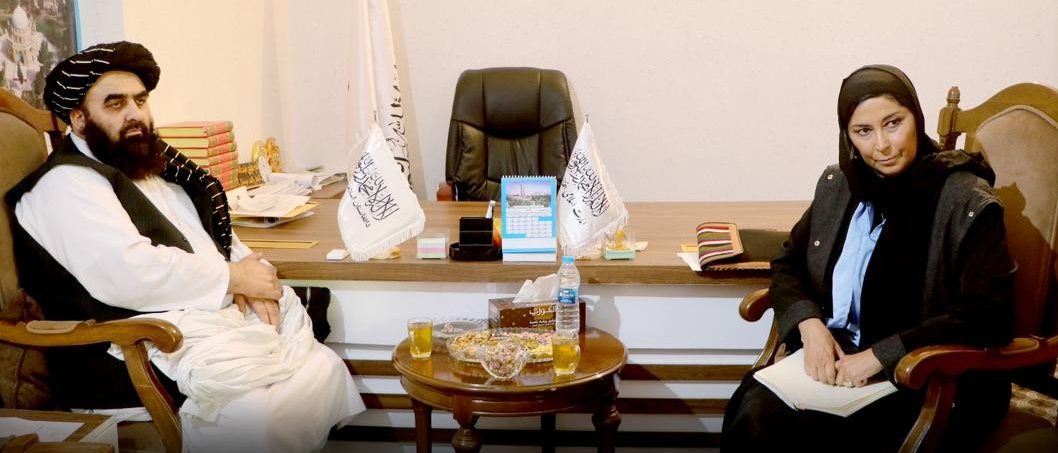Afghanistan’s Crises Require a Clear Statement of U.S. Policy
The United States needs to articulate its approach, to make clear its intentions and provide leadership for an international humanitarian response.

Editor’s Note: Although Afghanistan has faded from the headlines, the crises the country is facing remain intense—and have grown worse under the Taliban. My Brookings colleague Madiha Afzal argues that now is the time for the Biden administration to articulate its policy toward Afghanistan, both to ensure a better U.S. approach and to garner more international support.
Daniel Byman
***
The United States may be out of Afghanistan, but America’s dilemmas on Afghanistan policy continue. Political and general public discussions about Afghanistan since August 2021 have focused mainly on the botched withdrawal (with Congress now conducting hearings on the issue), the evacuations of Afghan partners and allies, and how to engage in counterterrorism with the Taliban in charge. Meanwhile, other key questions of policy, particularly those relating to the country’s human rights and humanitarian crises, get little high-level attention. That’s not surprising—it’s clear that President Biden wants to move on from Afghanistan and the failures associated with it—but the United States needs a better articulation of its current policy approach toward Afghanistan and the 40 million Afghans dealing with both a repressive regime and economic hardship.
Afghanistan’s Twin Crises
Afghanistan plunged into a humanitarian crisis immediately following the withdrawal in 2021 as the levying of sanctions on the Taliban, the drying up of international assistance, and the freezing of reserves meant the Afghan economy essentially lost all liquidity. Donor assistance and the work of international and local aid organizations largely staved off the worst fears of a humanitarian catastrophe during the first winter of Taliban rule. The United Nations’s humanitarian response plan for 2022 was $4.4 billion—the largest in the world that year—and the United States has been the single largest humanitarian donor to Afghanistan, contributing $1.1 billion in the year after the withdrawal. To deal with the hurdle posed by sanctions against the Taliban, the U.S. Treasury Department granted carve-outs so that aid could reach the needy directly. This included the ability to directly pay teachers’ and health care workers’ salaries.
This humanitarian aid has inserted badly needed liquidity into the Afghan economy; in so doing, it has indirectly benefited the Taliban, who have been running a successful tax collection operation. But it hasn’t reduced the dependence of Afghans on assistance this year. The U.N. humanitarian plan in 2023 grew slightly relative to 2022, with a funding appeal of $4.6 billion, once again the largest in the world. This year, 28 million Afghans—more than two-thirds of the population—are in need of humanitarian aid. In the wake of a brutally cold winter, an estimated 6 million Afghans are now “knocking on famine’s door,” according to Martin Griffiths, the U.N.’s top aid official. Afghans require sustained assistance to maintain even their current low-level equilibrium. There are worries that it might not come through.
At the same time, the Taliban’s increasingly repressive rule has systematically rolled back the basic rights of Afghan women and girls, severely constraining their lives: first by shuttering girls’ secondary schools, then by restricting access to public parks and gyms, and most recently, in a double blow in December 2022, by barring women from attending universities and working for nongovernmental organizations (NGOs). The Taliban’s onslaught against rights and freedoms extends beyond women to those who worked with the previous government and security forces.
Each of these decisions has drawn condemnation from the international community and highlighted the dilemma of how to deal with a brutal regime intent on curtailing human rights; it has also seriously tested the resolve of donors to contribute to the country. The Taliban’s latest decision on women’s NGO work is a direct blow both to women’s rights and to humanitarian assistance in Afghanistan, given that women workers form a key part of NGO aid delivery operations and that their incomes are crucial for their households. It left humanitarian organizations in a bind about how to proceed with aid delivery; in the immediate aftermath of the ban, many of them suspended operations because they were unable to function, devastating both their female workers and those dependent on them for aid. In the months since, aid organizations have been able to seek exceptions from the Taliban and seem to have at least partially resumed operations, but this rule still poses a constraint on their work.
Failed Leverage and Reactive Policy
The premise of the U.S. withdrawal from Afghanistan and the promise of a sensible future policy toward the country was the notion of leverage—that the United States would have influence over the Taliban through the use of economic tools (including sanctions and access to development assistance and financial reserves) and diplomatic tools (such as international recognition) to pressure them to moderate their behavior and their approach to women’s rights. That premise has been falsified; neither economic nor diplomatic tools have in any way moved the hardline Taliban leadership in Kandahar, which is responsible for the policy edicts that have removed women and girls from the public sphere. (The Taliban leaders in Kabul seem ostensibly to be more open to moderation, but they are not in charge of policy, at least for now.)
Given this failure of leverage, and in response to the economic and humanitarian crisis that emerged after the withdrawal, the United States and international organizations have crafted a humanitarian policy response that essentially exists separate from its economic and diplomatic tools, instead using carve-outs to sanctions and an extensive aid operation that reaches the Afghan population directly. This policy was largely reactive and hence delayed by some months, but in the end it was the right response to meet the needs of the Afghan population and manage the dilemma posed by Taliban intransigence. America owed at least this much to Afghans after 20 years of war there, and Biden himself promised that the United States would “continue to support the Afghan people through diplomacy, international influence, and humanitarian aid” after the withdrawal. This policy approach has allowed the United States to toe the line on values and rights by applying its diplomatic and economic penalties to the Taliban regime (however ineffective they’ve been) while still assisting the neediest Afghans.
Current U.S. policy has left one item partially unresolved: the $7 billion in frozen Afghan central bank reserves held by the United States that rightly belong to the Afghan people. The United States has made half that amount available to benefit Afghans (but not the Taliban) through a Swiss-based Afghan Fund; the other half remains frozen as part of a legal claim made by the families of 9/11 victims. While it’s still unclear whether the fund will be able to function effectively in practice, this was a compromise solution prepared when the Taliban were unable to assure the United States that the Afghan central bank would be independent. In February 2023, a U.S. judge denied the 9/11 families’ request to seize the remaining $3.5 billion in reserves; the Biden administration should now ensure that this second half of the reserves reaches the Afghan Fund as well.
The United States and the West’s policy response to Afghanistan over the past year and the low-level equilibrium that response attained are now being tested by the Taliban edict banning women’s NGO work, which has strained these NGOs’ operations and tested the resolve of donors. But international aid organizations say they remain committed to working with the Taliban to find exceptions and ways to ensure that assistance reaches the needy. Unfortunately, there is no other option.
Time for a Clear Statement
The Biden administration has deliberated and implemented its Afghanistan policy quietly since August 2021, likely not wanting to draw attention to the ignominy of the Taliban takeover—and the futility of the tools that were supposed to moderate Taliban behavior—nor otherwise stir the political pot. But beyond issuing condemnations of Taliban policies, the administration would do well to elevate its principled approach to the delivery of humanitarian assistance to Afghanistan. Officials should publicly identify the policy dilemma they face and their lack of good options, and they should be clear about the principles that define current U.S. policy toward Afghanistan—especially that humanitarian aid is and should remain unconditional.
This articulation of policy would better explain the administration’s approach over the first year of Taliban rule and would reach a receptive audience internationally. It is especially crucial now that the sustainability of this approach is under threat from the Taliban’s abhorrent decision on women’s NGO work and increasing donor fatigue. The United States has not clearly articulated its policy response to the Taliban’s latest decisions nor announced a new tranche of humanitarian assistance since December. Stepping forward with a statement that it is committed to ensuring the unconditionality of humanitarian aid for needy Afghans, as the single largest humanitarian donor to Afghanistan, would send an important message. It would also help bolster the case for international donors to contribute to this year’s U.N. appeal and will be necessary to stave off yet another potential humanitarian disaster in Afghanistan.





